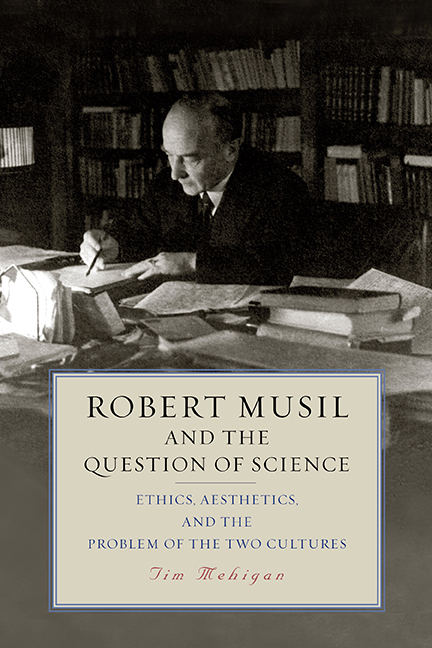Book contents
- Frontmatter
- Contents
- Preface
- Introduction: Musil’s Intellectual Position
- Part I Musil and the Two Cultures
- Part II Aesthetics and Ethics in the Context of the Two Cultures
- Conclusion: “A General Secretariat of Precision and Soul”: Ethics, Knowledge, and Literature after the Fourth Revolution 149
- References
- Index
8 - The Problem of Trust in The Man Without Qualities
Published online by Cambridge University Press: 26 April 2020
- Frontmatter
- Contents
- Preface
- Introduction: Musil’s Intellectual Position
- Part I Musil and the Two Cultures
- Part II Aesthetics and Ethics in the Context of the Two Cultures
- Conclusion: “A General Secretariat of Precision and Soul”: Ethics, Knowledge, and Literature after the Fourth Revolution 149
- References
- Index
Summary
MODERN LIFE in technologically advanced societies involves a considerable measure of complexity. How such complexity is to be borne by individuals appears to be an increasing problem for such societies. In Niklas Luhmann's view, complexity is principally dealt with in these kinds of societies on the basis of the concept of trust. In Luhmann's analysis, social trust is an abstract concept whose aim is the conservation and promotion of intersubjective tolerance. Social trust in social groups works by analogy with trust between individuals, where a psychological gain is associated with the rewards that flow from successful trust strategies. Luhmann's approach sets out a comprehensive theoretical framework by which systems, environment, function, and complexity are understood to be structural components of a social theory of communication. According to Luhmann's understanding, society itself is already a form of communication and, in the reverse, communication a form of society: “Society cannot be conceived without communication, and communication, for its part, not without society… . The reproduction of communications by way of communications takes place in society” (Luhmann 1997, 13). As soon as social communication is approached in this matter, it is a short route to the conclusion that modern societies are faced with the real-world problem of complexity management. Luhmann says that social communication “contains more possibilities than that which the system can conserve reactively.” Although a system adjusts selectively and autonomously to its environment, it is the human agents in the system who, in their awareness of the world's complexity and through the nature of their personal experience of their “world,” face the referential problem of how to attend to their own individual self-conservation within the system.
With these starting assumptions in mind, I would now like to drill down into this problem of complexity in the context of Musil's novel The Man Without Qualities. In doing so, I touch upon a set of concerns that have been enlarged upon in literature by several authors over the last 200 years—one thinks, perhaps above all else in German literature, of the early-nineteenth century Prussian author Heinrich von Kleist (1788– 1811), in whose works—as was recognized early in research on Kleist— the question of trust appears front and center among his themes.
- Type
- Chapter
- Information
- Robert Musil and the Question of ScienceEthics, Aesthetics, and the Problem of the Two Cultures, pp. 122 - 134Publisher: Boydell & BrewerPrint publication year: 2020



